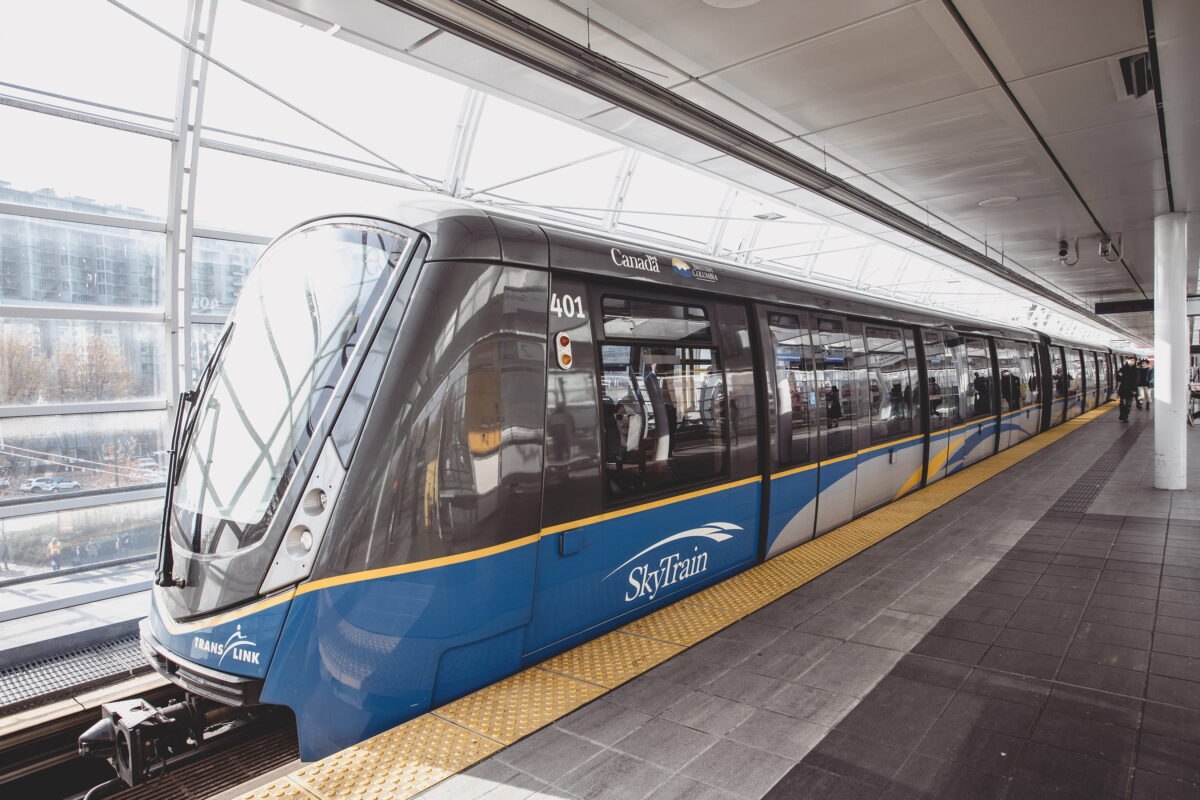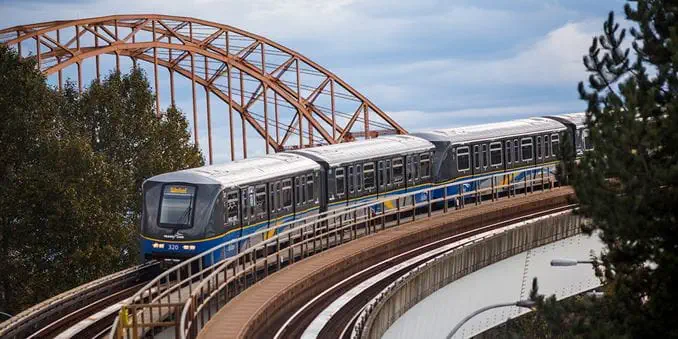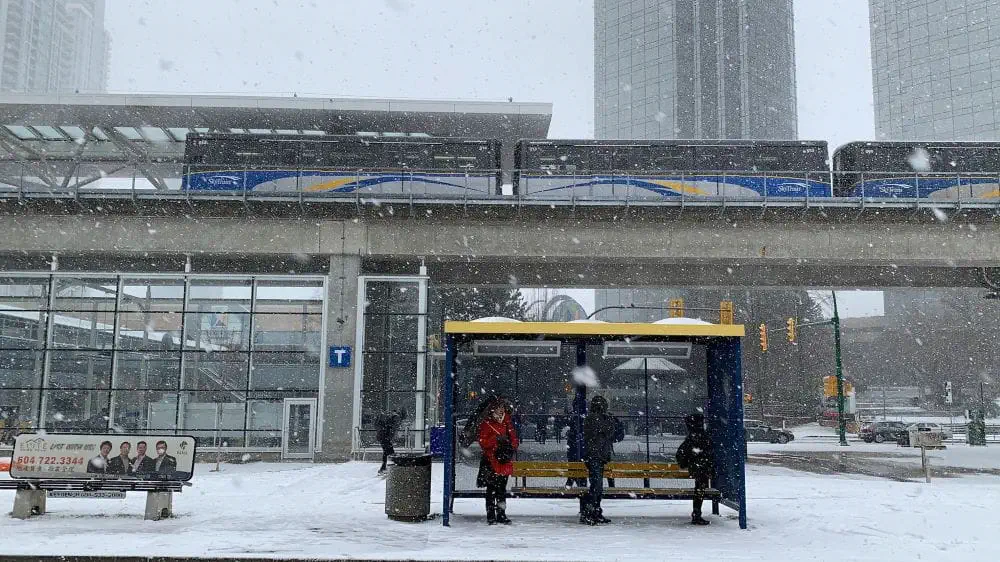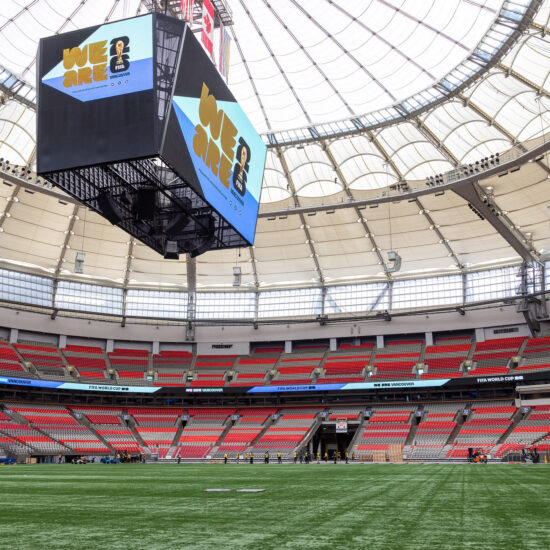
Bob Mackin
The tentative new contract between B.C. Rapid Transit Company and SkyTrain workers calls for a 6.75% pay raise effective Sept. 1.
On June 29, CUPE 7000, which represents workers on the Expo and Millennium lines, reached the agreement with the division of TransLink after 10 days of talks. Details were not announced.

SkyTrain near Pattullo Bridge (TransLink)
According to a leaked copy of the memorandum of agreement, pay will rise by at least 16.25% over the life of the five-year deal. The union recommends members accept the contract and is holding information meetings via Zoom on July 17, before a vote later in the month.
This follows the April-negotiated contract between Unifor locals 111 and 2200 and Coast Mountain Bus Company that would see pay rise between 11.25% and 12.5% through March 31, 2026 at TransLink’s bus division.
The CUPE 7000 deal contains a no contracting out clause to protect jobs of existing SkyTrain workers and the formation of a joint committee of three company representatives and three union representatives to discuss “contracting in” work that is currently contracted out.
Pay will also increase on Sept. 1, 2024 by 2% or 3%, based on the 12-month rate of inflation beginning Sept. 21, 2023. Further increases are scheduled at 2.5% annually in 2025 through 2027. The the final two years could be higher in order to match whatever general wage increase Unifor members achieve in their next contract from CMBC.
Non-skilled trades workers get a .24% adjustment plus 25 cents per hour in 2025.
According to an appendix in the Aug. 31-expiring contract, SkyTrain pay ranges from $29 an hour for a parts driver to $58.41 an hour for an elevator/escalator technician. For administrative workers, $28.08 is the hourly rate for receptionists and administrative support clerks and, on the other end of the scale, $57.18 per hour for a control centre instructor.
Workers on duty Sundays will be paid time-and-a-quarter for all work hours beginning Sept. 1. That increases to time-and-a-half in 2026. Workers on afternoon shifts will see their $1.80-an-hour shift differential bumped to $2 an hour on Sept. 1. The nighttime differential increases by $1 to $4 an hour on Sept. 1. By 2027, it will reach $6 an hour.
The company will pay union president Tony Rebelo’s wages for one day a month to a maximum of 120 hours per year and also pay $20,000 to the union for the purposes of bargaining.
The new deal also gives workers eight, full-paid individual sick days beginning Jan. 1, 2024. A maximum of five sick days may be used consecutively. There are various increases to benefits and allowances, such as $2,500 more to see a psychologist or registered clinical counsellor, to a maximum $4,000 a year, and a $500 increase to annual physiotherapy payments, now capped at $1,500.

(TransLink)
The maximum $5,000, interest-free loan for entering a residential substance abuse treatment program is tripled to $15,000. Upon successful completion of a monitoring agreement, the company will forgive the loan. The company can recover the debt in the event of failure or forgive 100% of the loan one time during the worker’s employment with the company.
Maternity leave is increased by six weeks to 18 weeks and the contract language is amended to replace references to mother with “birthing parent.”
Similarly, male and female pronouns are out and “they,” “them” and “their” are in. The wording of the fair practice anti-discrimination clause changes sexual “preference” to sexual “orientation” and adds protection for gender expression.
A letter of understanding upholds the provincially adopted United Nations Declaration on the Rights of Indigenous Peoples and contains measures aimed at increasing recruitment, retention and advancement of Indigenous employees. It contemplates an employment equity committee and training for anti-racism and cultural competency.
The Sept. 30 National Truth and Reconciliation Day is added to the list of statutory, paid holidays. Indigenous workers will receive an unpaid day off to observe National Indigenous Peoples Day every June 21. By request, an employee may have an elder or support person of their choice present when dealing with issues affecting Indigenous employees.
A side letter from BCRTC labour relations director Kevin Payne to Rebelo on June 29 says that the union will be given an opportunity to discuss its concerns should the company rescind its November 2021-implemented work-from-home policy.
Another June 29 letter clarifies how the company deals with special leave requests for employees who attend incidents after a person is struck or run over by a SkyTrain.
Affected employees may request time off for special leave through their manager/supervisor to the labour relations department.
“Special leave will only be approved for the remainder of the shift; and if necessary, the shift immediately following the date of incident. Should an employee require additional time off as a result of their attendance at the incident site, they will be required to file a claim with WorkSafeBC,” the letter said.
So-called “dirty work employees” called to don personal protective equipment and clean up after a track level incident involving human contact shall receive a premium of two hours equal to 200% of their normal straight time pay rate.
A new clause about accident/incident investigations says supervisors involved in a safety investigation will only participate as a witness and any statements by an employee will not be used beyond the investigation.
TransLink is studying the feasibility of erecting platform barriers to prevent people from jumping or falling into the track area as it approaches the 40th anniversary of service in two years. A 2001 B.C. Coroners Service (BCCS) report cited a 1994 SkyTrain safety review that estimated it could cost as much as $2.2 million to retrofit each station with platform screen doors.
BCCS statistics show that, between 2008 and 2018, 32 people died of suicide on the SkyTrain system.
Support theBreaker.news for as low as $2 a month on Patreon. Find out how. Click here.











